MercoPress. South Atlantic News Agency
Economy
-
Friday, September 13th 2013 - 20:50 UTC
Argentina formally requests US Supreme Court to review Appeals court favoring holdout hedge funds

Argentina’s legal representation in Washington DC yesterday sent a petition for a writ of certiorari to the United States’ Supreme Court, requesting Justices to accept its appeal against the Second Circuit Court of Appeal’s ruling in favour of holdout hedge funds, which are demanding full repayment for bonds left unpaid by Argentina’s record-breaking 2002 default.
-
Friday, September 13th 2013 - 02:29 UTC
Aerolineas Argentinas admits to annual losses of 250 million dollars

Argentina’s flag carrier Aerolíneas Argentinas will have this year an operational deficit of 250 million dollars, approximately 12% of sales, but a sharp decrease from the 640 million loss last year, said CEO Mariano Recalde addressing Senate Budget, Finance, Infrastructure, Housing and Transport committees.
-
Friday, September 13th 2013 - 02:26 UTC
Dow Jones industrial average revamped: Alcoa, BofA out, Nike, Visa, Goldman Sachs

The Dow Jones industrial average, one of the world's best known measures of stock market performance, is having a revamp. Alcoa, Bank of America and Hewlett-Packard are being dropped from the index of the top 30 US companies. From 23 September they will be replaced by Goldman Sachs, Nike and Visa.
-
Friday, September 13th 2013 - 02:21 UTC
UPM assessed as industry leader in environmental sustainability
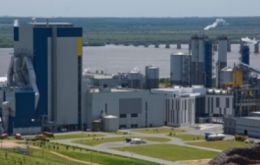
Finland’s energy and pulp UPM group has again been named among the world's sustainability leaders. The company has retained its position in both the Dow Jones European and World Sustainability Indices (DJSI) for 2013-2014. Furthermore, the company has been assessed as the industry leader in environmental sustainability within the Paper and Forest Products sector with top scores.
-
Friday, September 13th 2013 - 01:34 UTC
Argentina forecasted to expand 5.1% this year and 6.2% in 2014, says budget presented to Congress
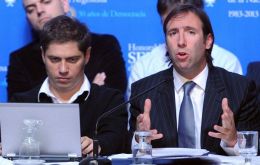
Argentina's economy is expected to grow 6.2% next year, while GDP in 2013 is forecasted to expand 5.1% boosted by a massive grains harvest and the automobile industry, Economy Minister Hernan Lorenzino said on Thursday while presenting the 2014 budget bill before Congress.
-
Thursday, September 12th 2013 - 05:14 UTC
Mega-regional accords could lead “to redefinition of world trade rules by 2020”

One of the main features emerging with the current international economic situation is mega-regional negotiations linking the main world production networks: Europe, North America and Asia and sometimes skirting WTO, according to the latest report on the Latinamerican and Caribbean economy from Eclac (UN Economic commission for Latam and the Caribbean).
-
Thursday, September 12th 2013 - 01:42 UTC
S&P downgrades Argentina’s credit rating to the level Cyprus and Egypt

Argentina’s long-term sovereign foreign currency credit rating was cut one level by Standard & Poor’s, which cited a US Appeals Court ruling that prevents the country from honouring its debt without also paying holders of defaulted bonds in full.
-
Thursday, September 12th 2013 - 01:20 UTC
Argentina inflation in August according to congressional index: 2.11%
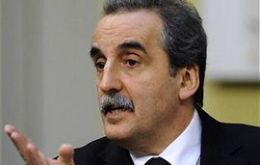
Inflation in Argentina during August climbed 2.11% and 25.2% in the last twelve months according to the release from the Congress Freedom of expression commission. The so called Congressional index is an average of private consultants that have been intimidated from making public their estimates by the government of President Cristina Fernandez.
-
Thursday, September 12th 2013 - 01:14 UTC
Latam trade and growth reflects the weak global economy says Eclac
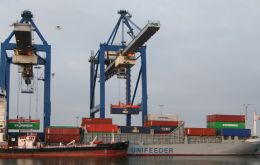
The foreign trade performance of Latin America and the Caribbean reflects the weak global economy. Regional export values are expected to grow by just 1.5% in 2013 (3% in volumes and -1.5% in prices) - which is similar to the 1.4% growth observed in 2012.
-
Wednesday, September 11th 2013 - 22:09 UTC
Venezuela media running out of newsprint; lack of dollars to import
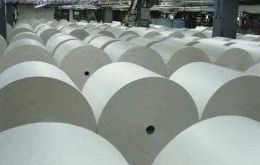
While the world press decries plunging print readership and advertising revenue, newspaper editors in Venezuela are struggling with a much more fundamental problem: lack of newsprint.
